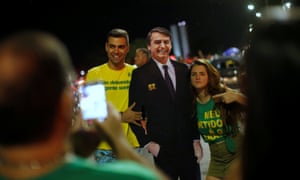Controversial admirer of dictators says in video broadcast: ‘We are going to change the destiny of Brazil’
A far-right, pro-gun, pro-torture populist has been elected as
Brazil’s next president after a drama-filled and deeply divisive
election that looks set to radically reforge the future of the world’s
fourth biggest democracy.
Jair Bolsonaro,
a 63-year-old former paratrooper who built his campaign around pledges
to crush corruption, crime and a supposed communist threat, secured
55.1% of the votes after 99.9% were counted and was therefore elected
Brazil’s next president, electoral authorities said on Sunday.Bolsonaro’s leftist rival, Fernando Haddad, secured 44.8% of votes.
In a video broadcast from his home in Rio de Janeiro, Bolsonaro thanked God and vowed to stamp out corruption in the country.
“We cannot continue flirting with communism … We are going to change the destiny of Brazil,” he said.
Donald Trump called Bolsonaro to congratulate him and both men expressed a strong commitment to work together, the White House said.

News of the results sent Bolsonaro devotees outside his beachfront home in western Rio de Janeiro into ecstasy.
“This is phenomenal. It’s a unique feeling,” said Rafael Gomes, a 34-year-old salesman who was among the crowds. “I can see a better future for my son, better health, education and security, something we haven’t had for years.”
In the midst of an increasingly raucous atmosphere one group of young men jumped up and down chanting: “Go fuck yourselves, PT!”
Hordes of jubilant Bolsonaro supporters flocked on to Avenida Paulista, one of São Paulo’s most important boulevards, where they sang Brazil’s national anthem and set off fireworks.
Many fans wore the green and yellow colours of Brazil’s national flag, which has become the trademark of Bolsonaro’s push for power.
“I feel so happy. Brazil is waking up. We are coming out of a trance,” said Jordan Requena, a 20-year-old student who was among the crowds.

Pietro Sambugaro, a 28-year-old Bolsonaro activist, broke down in tears as he described his joy. “I feel so proud to have been part of this change. He is our hope!”
“For the first time we are going to have a God-fearing and genuinely right-wing president,” said Fernando Pereira, a 40-year-old physiotherapy student celebrating as fireworks exploded around him. “He is the president we have been waiting for for so long.”
But Bolsonaro’s triumph will leave many millions of progressive Brazilians profoundly disturbed and fearful of the intolerant, rightwing tack their country is now likely to take.
Over nearly three decades in politics, he has become notorious for his hostility to black, gay and indigenous Brazilians and to women, as well as for his admiration of dictatorial regimes, including the one that ruled Brazil from 1964 until 1985.
“The extreme right has conquered Brazil,” Celso Rocha de Barros, a Brazilian political columnist, told the election night webcast of Piauí magazine. “Brazil now has a more extremist president than any democratic country in the world ... we don’t know what is going to happen.”
Clóvis Saint-Clair, a Rio-based journalist who has written an unauthorised Bolsonaro biography, said he feared Brazil’s young democracy was at risk. “This is a moment of great doubt and apprehension.”
Saint-Clair said a cocktail of voter frustration at political sleaze and the successful demonization of the PT explained how a once widely ridiculed and peripheral firebrand had been catapulted from the political wilderness to the presidency.
Bolsonaro voters had voted on “feelings not facts” and were obsessively focused on the PT’s not inconsiderable sins while refusing to recognise the advances of its 13 years in power, which ended with Dilma Rousseff’s highly controversial impeachment in 2016.

Saint-Clair said he expected Bolsonaro to intensify police repression and pay scant attention to Brazil’s neediest citizens. “If he follows through on all the promises he has made, the next four years will be very difficult for the majority of the population.”
Chico Paiva Avelino, whose politician grandfather, Rubens Paiva, was tortured and disappeared under Brazil’s military regime in 1971, said he was disgusted that a man who had praised that dictatorship was on his way to the presidency.
“It is unacceptable that in 2018 someone can be elected off the back of this discourse,” the 31-year-old said.
However, for the tens of millions of voters who backed Bolsonaro, he represents change after years of economic recession and eye-watering corruption scandals that they blame on the Workers’ party, which ruled Brazil from 2003 until the impeachment of President Dilma Rousseff in 2016.
“We are happy. We want change,” declared Maicon Mesquita, a 23-year-old businessman who had brought his family to Avenida Paulista to celebrate. “He will be a president who has no involvement at all in corruption.”
The previous night, a group of young activists had set up camp just a few metres from where he stood in an ultimately futile last-minute bid to convince undecided voters to oppose Bolsonaro with offers of conversations and free cake.
“This is already a resistance movement to say that we don’t want war … we want a government that preaches peace,” said Luciano Andrey, a 39-year-old actor.
Andrey carried a handwritten placard that asked passersby: “Let’s talk about the future?”
On Sunday, as it entered a new, potentially illiberal political era, Brazil’s looked deeply uncertain.
No comments:
Post a Comment